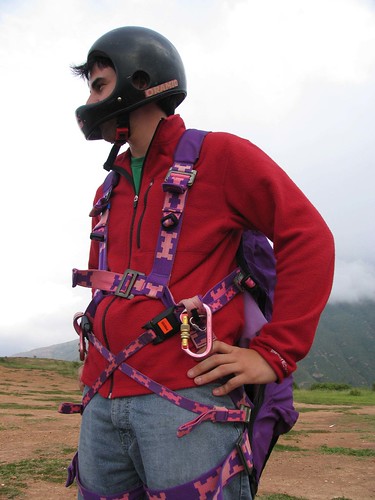Paragliding
I had gone the entire day avoiding it, avoiding concrete thoughts about what it would be like to hang up in the valley, to waft around on this and that draft, to fly. To fly.
But here I was on the edge of the cliff, strapped to a pony-tailed, pajama-pants-wearing Venezuelan hippie, waiting to leap toward the valley below. In front of me, the Chama tore a rough-hewn canyon through the mountains, and a bit higher up, the road to El Vigía shouldered up to the plateau on which several Mérida suburbs invisibly sat. Behind me, on a cow pasture among rolling Andean hills, a group of pale gringos readied themselves to trust a swath of nylon and a complete stranger. I was the first in our group to have to make that commitment.
Back on the winding mountain road from Las González, I had focused on the beauty of the ascent. A one-lane steel bridge over soft river rapids ceded to a series of rocky switchbacks, and at each hairpin the valley became farther away and the villages across the way that much more particular, separated. The divisions were striking: sky meeting jagged horizon, verdant hills against stark páramo, urban congestion and rural solitude. The views from the back of our oversized Land Cruiser made me forget the parachutes on the roof and the anxiety in my stomach, and save for a bit of car sickness due to the relentless turning and climbing, climbing and turning, I was ready for almost anything.
Brooke had taken pictures while Carlos strapped me in, but before I could even wish her well, tell her I loved her, thank her for a great run, I was connected to José on the edge. We waited for the wind to come and drive us into the valley, to lift us up and take us in her arms and let us fly, soar like the hawks and the eagles and the condors that make Andean myths, to throw us about at her whim and at our delight. By the time she finally came I was caught unawares, and the ground slipped from beneath my feet and the cliff fell lower and lower toward the river. I looked back at the pasture and saw nothing but miniature friends, their bodies and their concerns and their feelings reduced to nothing while we maneuvered around the valley, drooping and banking and gliding, oh, gliding, past small rock outcroppings and over larger-than-they-seemed trees, around the rim and over the road.
After a while we had companions in the air, and the hurtling height became a matrixed highway, criss-crossing in different directions and cutting the currents into sharp wisps and flowing curlicues. José talked about his life as an adventure guru, and I listened tentatively. I worried about my slipping straps, about the seat that constantly slid out from underneath me, leaving me standing in air, tied in at the groin and chest, flailing about. When I tried to heed José’s advice and stay back in the seat, my back seared and seized and left me shaking and unable to talk, adding to my disorientation.
It wasn’t until he mentioned that often people vomited on him that I began to get dizzy. The hills were no longer part of a beautiful landscape; they had turned into a depth-perception trick, a mind game of constant sinking and rising, rising and sinking. We spun about in tight circles, and I screamed to show off my exhilaration. Instead I think I showed my fear. My hands, which had earlier stuck out at my sides in imitation of the hawks circling below, now clutched the straps tight enough to induce sore knuckles. A half an hour had seemed like enough, like a good ride. The last 10, 12 minutes, though, dragged through shut eyes and swirling trees and lifts and loops and nauseating drops. We descended only to re-ascend, and I tried to gallantly keep asking questions, keep playing cool, keep readjusting my seat and saying I was fine and laughing at the other flyers, some of them yelling with delight, and others, like Brooke, tearing up with a flipped stomach and distorted vision. Landing, coming back to Earth, leaving the hollow space between top and bottom—that’s what I prayed for then.
I hardly remember hitting the ground, but I do remember failing to run, as I’d been instructed. My legs crumpled beneath me, and while I tried to bounce back up and sprint through the deserted lot and past the 10-year-old helpers and their small, belt-unbuckling hands, I couldn’t. I sat there, unable to move, and it took a little boy, dark-skinned, dirty, to tug at my fleece to rouse me to move. The flight was over. We had touched down. And I finally smiled as José grabbed me and jolted me back to my grounded life, back to my sensibilities, back into my body. I looked back up at the cliff, smiled, and muttered, “Never again.”

